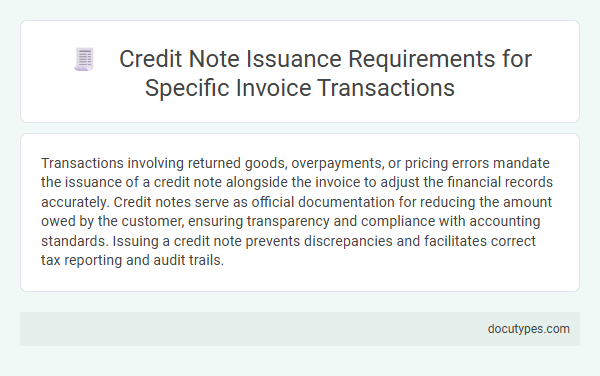Transactions involving returned goods, overpayments, or pricing errors mandate the issuance of a credit note alongside the invoice to adjust the financial records accurately. Credit notes serve as official documentation for reducing the amount owed by the customer, ensuring transparency and compliance with accounting standards. Issuing a credit note prevents discrepancies and facilitates correct tax reporting and audit trails.
Understanding Credit Notes in Invoice Transactions
| Transaction Type | Requirement for Credit Note Issuance | Description |
|---|---|---|
| Return of Goods | Mandatory | When goods are returned by the buyer, a credit note must be issued to adjust the original invoice amount, reflecting the returned items. |
| Billing Errors | Mandatory | If the original invoice contains errors such as overcharging or incorrect quantities, a credit note is required to correct the financial records. |
| Discounts or Price Adjustments Post-Invoice | Mandatory | When discounts or price changes are applied after the invoice has been issued, a credit note must be created to document and formalize the adjustment. |
| Cancelled Services or Deliveries | Mandatory | In cases where services or deliveries invoiced are cancelled, a credit note offsets the invoice to reflect the cancellation. |
| Promotional Offers Affecting Invoice Amount | Mandatory | If promotional discounts apply retroactively and affect the invoiced total, issuing a credit note ensures accurate financial reporting. |
Understanding when to issue a credit note with your invoice helps maintain accurate transaction records and ensures proper adjustments in your accounting system.
Legal Framework Governing Credit Note Issuance
The legal framework governing credit note issuance delineates specific transactions that require a credit note alongside the invoice. Understanding these requirements ensures compliance and accurate financial documentation for your business.
- Return of Goods - When goods are returned by the buyer, a credit note must be issued to adjust the original invoice amount.
- Price Adjustments - Any post-sale price reductions or discounts necessitate a credit note to reflect the revised transaction value.
- Correction of Billing Errors - Errors on the original invoice, such as incorrect quantities or prices, require a credit note to amend the financial records legally.
Criteria for Issuing a Credit Note
Credit notes must be issued for transactions involving returned goods, billing errors, or price adjustments. These documents serve to correct or reduce the original invoice amount, ensuring accurate financial records. You must issue a credit note whenever the initial invoice requires modification due to these specific criteria.
Situations Requiring Credit Note Issuance
Invoices sometimes require accompanying credit notes in specific transaction types to ensure accurate financial records. Understanding when to issue a credit note helps maintain transparency and compliance in your accounting process.
- Returned Goods - A credit note must be issued when the customer returns items due to defects or other reasons, adjusting the original invoice amount.
- Pricing Errors - If the invoice contains pricing mistakes, a credit note corrects the billed amount to reflect the accurate cost.
- Discounts or Allowances - When discounts or allowances are granted post-invoice issuance, a credit note formally documents the reduction in the amount payable.
Documentation Required for Credit Note Processing
Transactions involving returned goods, billing errors, or price adjustments mandate the issuance of a credit note alongside the original invoice. Issuing a credit note ensures accurate financial records and compliance with tax regulations.
Documentation required for credit note processing includes the original invoice, return authorization forms, and proof of agreed adjustments. Clear, complete paperwork facilitates prompt approval and accurate accounting entries.
Mandatory Information on Credit Notes
Certain transactions require the issuance of a credit note along with the invoice, especially when there are returns, discounts, or corrections in the billed amount. Credit notes serve as official documents to adjust or cancel the original invoice values.
The mandatory information on a credit note includes the reference to the original invoice, date of issuance, details of the buyer and seller, and the reason for the credit. Your credit note must also specify the amount credited and any applicable tax adjustments to ensure compliance with regulatory standards.
Timeframes for Issuing Credit Notes
Which Transactions Mandate the Issuance of a Credit Note with the Invoice? Certain transactions such as product returns, invoicing errors, and post-sale discounts require issuing a credit note alongside the original invoice. Timeframes for issuing credit notes typically range from 15 to 30 days from the transaction date, depending on local tax regulations and company policies.
Credit Note Approval Workflow
Certain transactions require a credit note to be issued alongside the invoice to ensure accurate financial records. Understanding the credit note approval workflow is essential for compliance and effective transaction management.
- Returns and Refunds - Transactions involving returned goods or service cancellations must have a credit note approved to adjust the original invoice amount.
- Pricing Adjustments - Any post-invoice discounts or pricing errors that reduce the billed amount require a formal credit note for approval.
- Overbilling Corrections - When the invoiced amount exceeds what was actually owed, a credit note must be issued and approved to rectify the discrepancy.
Your organization's credit note approval workflow streamlines validation, preventing unauthorized adjustments and maintaining accurate billing records.
Recordkeeping and Audit Compliance
Transactions involving returns, refunds, or pricing adjustments mandate the issuance of a credit note alongside the original invoice. Maintaining accurate records of these credit notes ensures compliance with audit regulations and facilitates transparent financial reporting. Proper documentation supports dispute resolution and adherence to tax and accounting standards.
Which Transactions Mandate the Issuance of a Credit Note with the Invoice? Infographic

